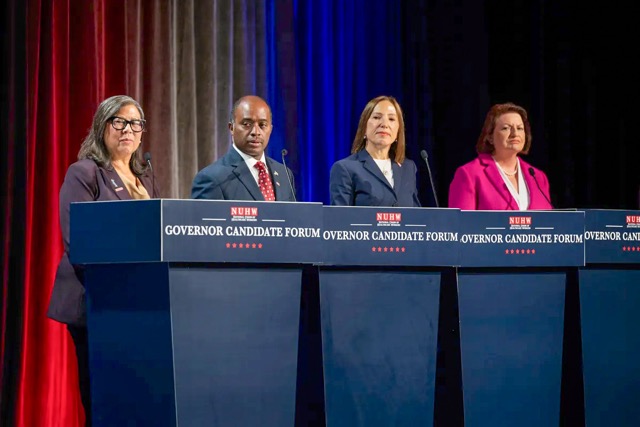California Governor
BY DAN WALTERS, CalMatters
California has a lengthy — very lengthy — list of critical economic, social and policy issues that are very likely to remain unresolved when Gavin Newsom vacates the governorship 26 months hence.
The nation’s highest levels of poverty and homelessness, shortages and rising costs of housing, exploding energy bills, an uncertain water supply, street crime, chronic educational shortcomings, a bullet train project that seems to be going nowhere, and multibillion-dollar budget deficits are merely the most obvious flashpoints.
Most were evident when Newsom was elected governor in 2018, promising vigorous efforts to neutralize them, such as his ridiculous pledge to build 3.5 million units of housing, but most have become even more intractable during his reign.
Given that unfortunate history, why would any sane person volunteer to step into Newsom’s shoes? The fact that quite a few Californians are weighing 2026 bids for the governorship testifies to the essentially irrational nature of political ambition.
The next political cycle begins with no clear frontrunners, which is a bit unusual. Rather, we have at least a dozen potential candidates, none of whom can claim more than fractional support, plus one huge unknown factor: Vice President Kamala Harris’s career plans after losing her presidential bid.
A new poll by UC Berkeley’s Institute of Governmental Studies confirms the lack of a frontrunner and, just for fun, tests the possibility of a Harris comeback run for governor, ala Richard Nixon’s vain attempt to become governor in 1962. While nearly half of voters surveyed said they would consider supporting Harris for the governorship, it could be as polarizing as her White House campaign.
“Considerations of Harris as a potential gubernatorial candidate are highly partisan,” the poll found, “with 72% of Democrats saying they would be very or somewhat likely to consider supporting her, while 87% of Republicans would not. Among voters not affiliated with either major party, 24% would be very likely and 13% somewhat likely to support a Harris 2026 bid for governor.”
Discounting a Harris candidacy, the poll found that another newly defeated Democrat, U.S. Rep. Katie Porter, sits atop the field, with 13% of voters ranking her as their first or second choice, followed closely by Chad Bianco, the Republican sheriff of Riverside County, at 12%.
Porter gave up her Orange County congressional seat this year to run for the U.S. Senate, but lost in the primary to another member of Congress, Adam Schiff, who claimed a Senate seat last week.
Among Democratic voters, Porter scores 22% support, more than twice what her most likely Democratic rivals garner. Lt. Governor Eleni Kounalakis, former Los Angeles Mayor Antonio Villaraigosa and U.S. Health and Human Services Secretary Xavier Becerra, the state’s former attorney general, all are in the 10-11% range.
Among Republican voters in the survey, Bianco and state Sen. Brian Dahle are virtually tied at about a third each.
The chances for any Republican to become governor are almost nil, given the overwhelming Democratic voter majority, but the state’s top-two primary system makes Republican candidates more relevant against a large field of Democrats.
That tactical element was very apparent earlier this year when Porter faced Schiff and a third Democrat, Rep. Barbara Lee. Schiff spent heavily to help Republican Steve Garvey finish in second place in the primary, ensuring a November win.
Counting Porter, there are five reasonably viable Democrats who might run next year — not only Kounalakis, Villaraigosa and Becerra but Attorney General Rob Bonta. A five-way split of Democratic voters would make it easier for a Republican to finish second in the primary, as Garvey did, and indirectly help the leading Democrat to become governor.
Let the games begin.
For More Visit www.zapinin.com/california-news


